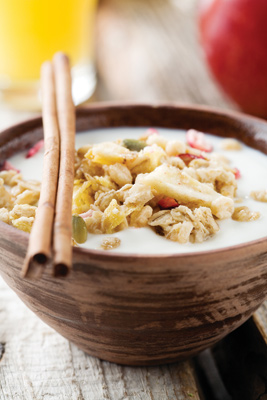Quease-friendly cuisine
There are many things about pregnancy that are indescribably wonderful. […]
There are many things about pregnancy that are indescribably wonderful. However, a few aspects are simply no fun at all. One of the biggest annoyances is morning sickness. Actually, let’s just call it what it is: all day queasiness with intermittent vomiting.
I was so sick during my first pregnancy that eating was almost impossible in the first trimester. I couldn’t hold anything down, and odors—even everyday, normal smells like coffee—sent me running for the bathroom at top speed. My story isn’t unique. According to Bridget Swinney, MS, RD, author of Eating Expectantly: Practical Advice for Healthy Eating Before, During and After Pregnancy, it’s estimated that up to 90 percent of pregnant women experience some degree of morning sickness. And, as she points out, there’s safety in numbers: “The good news is that nausea and vomiting in pregnancy … is thought to be a sign of a healthy dose of pregnancy hormones.”
Though reassuring, that healthy dose of hormones doesn’t make it any more enjoyable when you’re heaving and queasing throughout the day. A diet of bland foods often helps with the symptoms—it’s a lot easier to hold down a piece of plain toast than a chimichanga covered in cheese sauce—but it leaves some moms worrying whether they’re providing their developing little one with what they need.
We’re here with some good news: It’s possible to stick to taste-free foods while still baking a healthy bun. Here’s what to eat when you can’t keep anything down.
Breakfast really is the best meal of the day
Toast is the standard go-to for an unsettled stomach, but you’re not doing yourself any favors by reaching for the white bread. “Whole-grain breads like wheat and rye, as well as whole-grain cereals like oatmeal, are bland yet pack a dose of antioxidants, healthy carbs and fiber,” shares Swinney. A not-too-sweet crunchy cereal is another option. (Whole-wheat Cheerios are normally inoffensive to a turning tummy.) Swinney notes, “A fortified breakfast cereal is a great way to pick up many nutrients like folic acid, iron and other B vitamins, while the milk you put on it will give you calcium, vitamin D, potassium and six other essential nutrients.”
Fruit is your friend
If you can add some fruit to your diet, you —and your baby—will reap the benefits. Figuring out what’s easiest on your stomach is a game of trial and error: “Some women enjoy tart fruits like grapefruit or tangerines, while others prefer sweet and smooth, like applesauce,” Swinney says. Bananas can be a suitably bland choice, and they’re a great source of potassium. Another tip from Swinney: “Juice is a great way to hydrate healthfully when you can’t eat or drink much. The most nutrient-rich fruit juices are blackberry and blueberry, cherry, purple grape, pomegranate and prune.” She reminds pregnant moms to avoid unpasteurized varieties.
Embrace the cold
“Eating cold foods is often appealing when the queasies hit,” Swinney shares. Hot meals might be out, but luckily there are fridge-friendly options that pack a punch. “Cottage cheese, Greek yogurt and tofu provide an excellent source of protein and calcium yet are easy on the stomach.” If the tang of Greek yogurt doesn’t sit well with your sickness, blend it with your favorite fruits and a splash of fruit juice to create a smoothie. It’s cold, gentle on the stomach, and healthy (as long as you keep the sugar in check)—triple win.
I say potato …
While starchy foods aren’t regularly found at the top of the nutrition list, they can be easier to keep down than other provisions. Brown rice isn’t a bad choice—it is considered a whole grain and is rich in antioxidants, fiber and proteins. Potatoes are a popular option for upset stomachs, and they’re not as bad for you as you might think: Fiber, healthy phytochemicals, potassium and vitamin B6 are all benefits of a good old baked spud. Bonus points (and nutrients) if you can scarf down the skin too.
Eggcellent choice
Whether you can stomach them scrambled or boiled, “Eggs are a supreme comfort food, contain ‘perfect’ protein, and are one of the best sources of choline, which may help prevent neural tube defects,” says Swinney. I found scrambled eggs to be relatively inoffensive to my stomach when I was suffering from morning sickness—as long as I let them get cold before I began chowing down. (Weird, right?) For some reason, they stayed where they belonged (in my belly) better when they were no longer warm.
Liquid diet
Slurping down some chicken broth might be your only option if even the thought of a solid meal makes you heave. Homemade broth is your best bet—it boasts a handful of good-for-you minerals like calcium and potassium—but if you aren’t able to make it yourself and don’t have anyone offering to do it for you, the store-bought variety is better than nothing. (Just keep an eye on your sodium intake since boxed broth is often swimming with salt.) As your stomach strengthens, toss in some soft vegetables for added nutrients. Eventually you’ll work your way up to throwing in pasta and chicken for your mom’s favorite upset-tummy remedy: chicken noodle soup.
Morning sickness can be worrisome, but it typically passes in time. In most cases, the symptoms ease by the 12th week. (If you continue vomiting into your second trimester, be sure to let your doctor know.) Soon you’ll be back to eating the foods you love and your queasy days will be but a distant memory.








